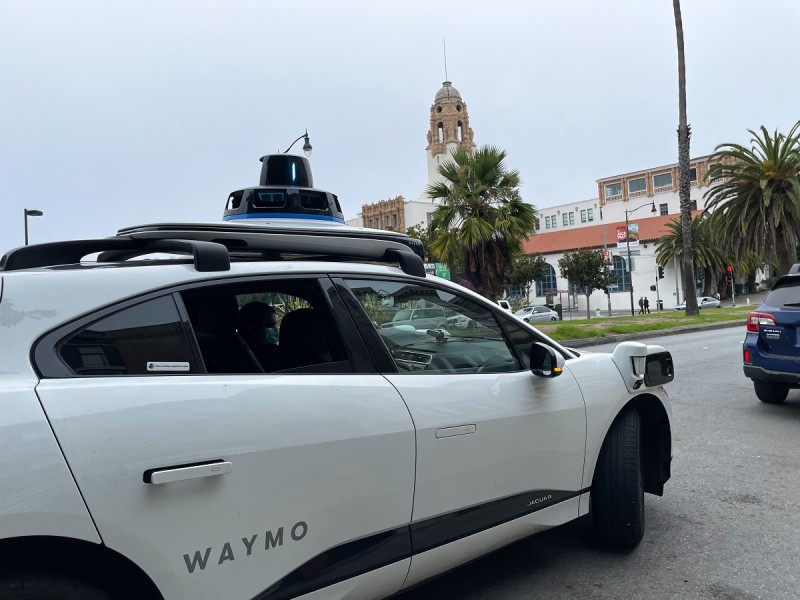A Waymo Jaguar SUV outside Mission High School. Photo by Yujie Zhou.
Multiple sources have confirmed that Mayor Daniel Lurie’s administration has struck a deal with Waymo to let the autonomous vehicle company into San Francisco International Airport to “map” its environs for future autonomous use.
The move is a precursor to full service by robo-taxis at SFO, which would allow passengers to hail the driverless cars and be dropped off by them at the Bay Area’s busiest airport, a financial boon for the company and the crown jewel in its Bay Area expansion plan in San Francisco, the Peninsula and the South Bay.
SFO would become the first airport across California where Waymo can operate, but it came at a cost to the company, which agreed to several concessions to obtain the needed permit.
Namely, Waymo will not be allowed to engage in any commercial activity at the airport, and it will share some data with the San Francisco city government. The nature and extent of the data sharing is not yet clear.
“The permit shall prohibit the movement of ‘commercial goods’ by use of an autonomous vehicle on airport property,” reads the language governing Waymo’s use of the airport, according to a copy viewed by Mission Local. “‘Commercial goods’ means any goods, wares, merchandise, or other tangible items requiring transportation for a fee or a commercial purpose.
Commercial goods include any items for which a motor carrier permit is required.”
The permit went into effect on March 14 and is valid through April 13, and the airport can extend it then for another 30 days.
The ban on commercial and delivery activity at the airport was a requirement for keeping the Teamsters union from fighting the deal. The union worked last year with state legislators to require vehicles of 10,000 pounds or more to have a driver, but Gov. Gavin Newsom vetoed this legislation. This year, the Teamsters and state legislators are attempting to prevent autonomous vehicles from breaking into the commercial-delivery field.
Doing so would protect thousands of union delivery drivers at outfits like DHL and UPS.
Peter Finn, the secretary-treasurer/principal officer of Teamsters Local 856, praised the administration of Mayor Daniel Lurie and San Francisco airport executives for helping to bring about “commonsense implementation for this technology that takes into account safety and jobs. It’s an example of what we are trying to do on the state level.”
The deal would mark a turning point in a two-year struggle for Waymo, which in early 2024 won the right to pick up and drop off passengers in San Francisco, and last week announced it would do so in several Peninsula cities. It had tried, hitherto unsuccessfully, to break into the airport.
Waymo also operates in Phoenix, Arizona; Los Angeles; and Austin, Texas; and has access to the airport in Phoenix.
Shortly after the publication of this story, the mayor’s office sent out a press release announcing the pact.
“This agreement is another example of how San Francisco is driving innovation while supporting economic recovery,” Lurie said in the release.
“We’re pleased to play a part in showing the world that the future starts here in San Francisco,” added Nicole Gavel, Waymo’s head of business development and strategic partnerships.



